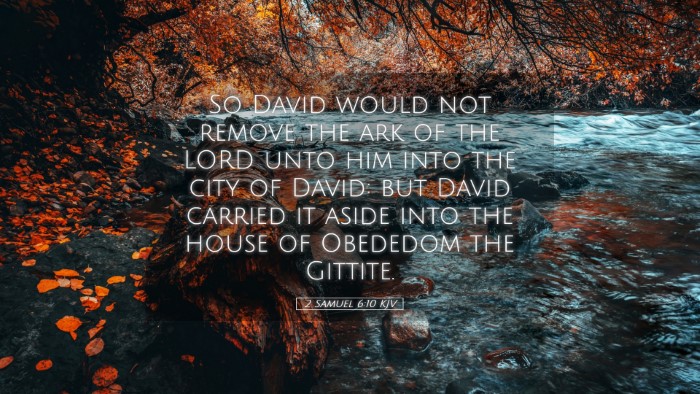Commentary on 2 Samuel 6:10
Verse: "So David would not remove the ark of the LORD unto him into the city of David: but David carried it aside into the house of Obed-edom the Gittite."
Introduction
This verse marks a critical moment in the narrative of David’s reign and his relationship with God, particularly regarding the Ark of the Covenant. Commentators such as Matthew Henry, Albert Barnes, and Adam Clarke provide valuable insights into the significance of this event, its theological implications, and its applications for contemporary believers.
Historical Context
The transport of the Ark to Jerusalem was an attempt by David to centralize worship in the nation of Israel. However, the circumstances surrounding this event were marked by disobedience and a lack of reverence for God’s commands regarding the handling of the Ark.
- Background of the Ark: The Ark symbolized God’s presence and His covenant with Israel. It had been captured by the Philistines and returned under tumultuous circumstances.
- David’s Initial Intent: David desired to bring the Ark to Jerusalem to establish a central place of worship, signifying a unified national identity under God's leadership.
David’s Decision Not to Bring the Ark to His City
David's decision to halt the procession and house the Ark elsewhere reflects a moment of introspection and a recognition of the gravity of the situation. Imbued with lessons from his previous experience, David's actions show his understanding of both divine holiness and human frailty.
- Reverence for God’s Holiness: David recognized that the hand of the Lord had struck Uzzah when he touched the Ark, a reminder of the serious consequences of approaching God’s presence without due honor.
- Fear and Respect: The sudden and devastating death of Uzzah induced a fear of the Lord in David, prompting him to reconsider the transport of the Ark.
The House of Obed-edom
David's choice to place the Ark in the house of Obed-edom serves as a testament to God's grace and favor. The house of this Gittite became a symbol of blessing and prosperity as the Ark resided there.
- Symbolism of Blessing: The blessings that Obed-edom's household received while the Ark was there illustrate God’s mercy and favor towards those who honor Him.
- God’s Presence in Ordinary Lives: The account underscores that God’s presence can transform ordinary lives into places of divine blessing, regardless of one’s background.
Theological Insights
This passage evokes several key theological themes worthy of further reflection:
- God’s Holiness: The narrative emphasizes the necessity for reverence and holiness in approaching God, reminding believers of the seriousness of their worship.
- Grace and Judgment: The juxtaposition of Uzzah's judgment with Obed-edom’s blessing reflects the dual nature of God’s character—righteous in justice and abundant in grace.
- The Importance of Proper Worship: David’s initial missteps reveal that worship must be executed in a manner pleasing to God, guided by His Word.
Practical Applications
For pastors, students, and theologians, this verse offers vital lessons for contemporary faith communities:
- Reverence in Worship: Maintaining a sense of awe and respect in worship is crucial as congregations seek to honor God’s presence.
- Openness to Correction: Leaders must remain teachable and willing to correct courses of action when motivated by pride or ignorance.
- Seeking God’s Blessing: Communities should seek God’s blessing in all endeavors, recognizing that His presence should transform their lives and those around them.
Conclusion
2 Samuel 6:10 encapsulates a potent moment in David’s life, embodying themes of divine reverence, holiness, and the interplay between judgment and grace. As such, it serves as a rich source of reflection for anyone engaged in the study of God's Word, offering timeless insights applicable to modern faith practice.


